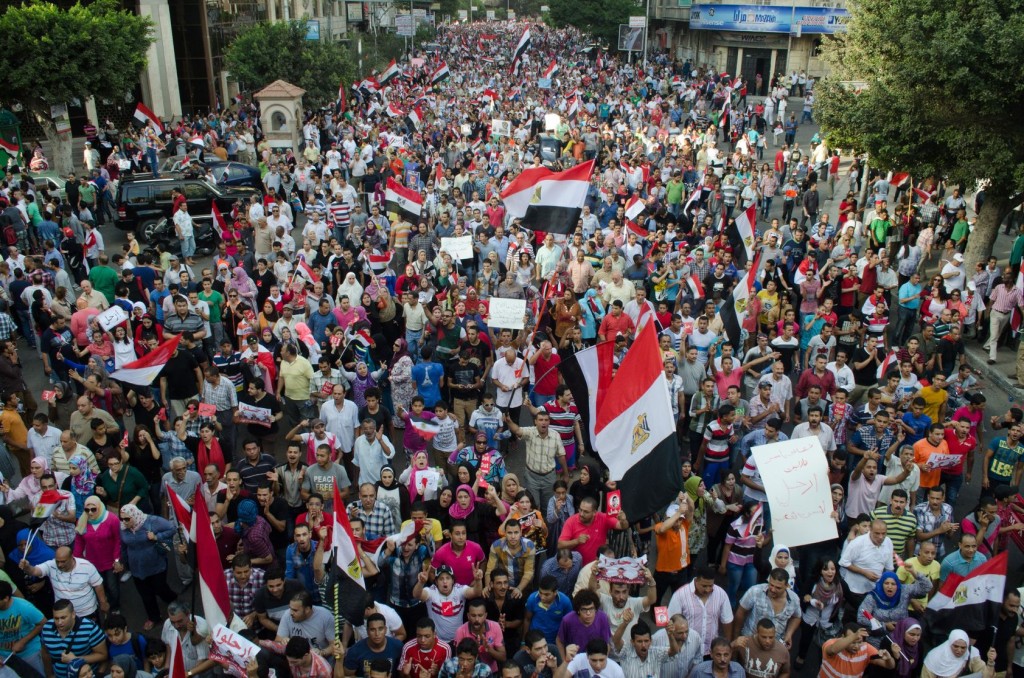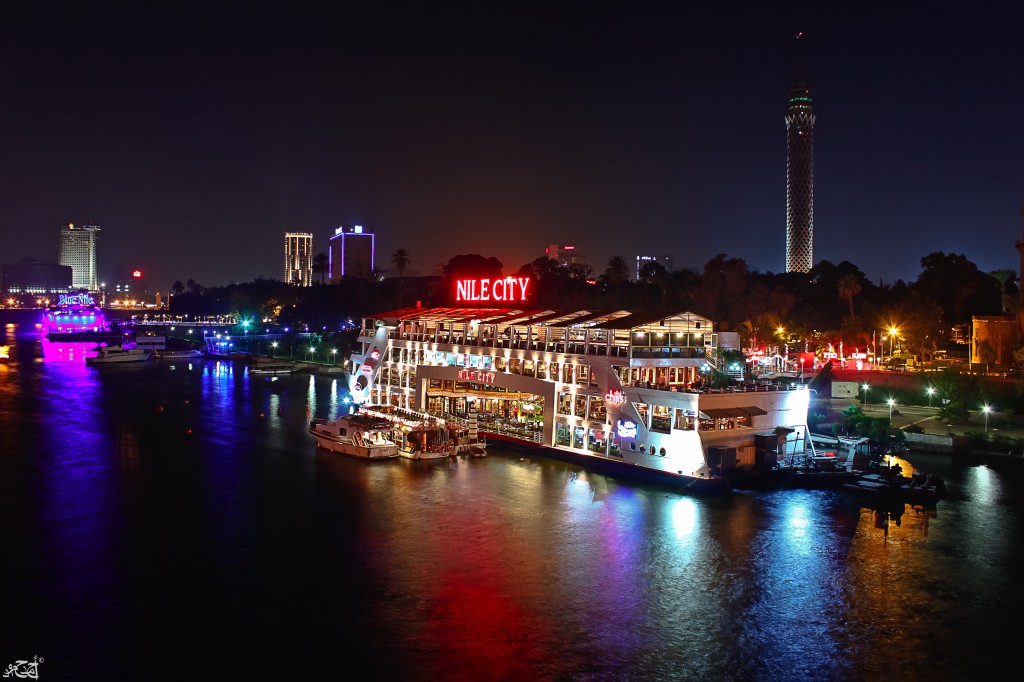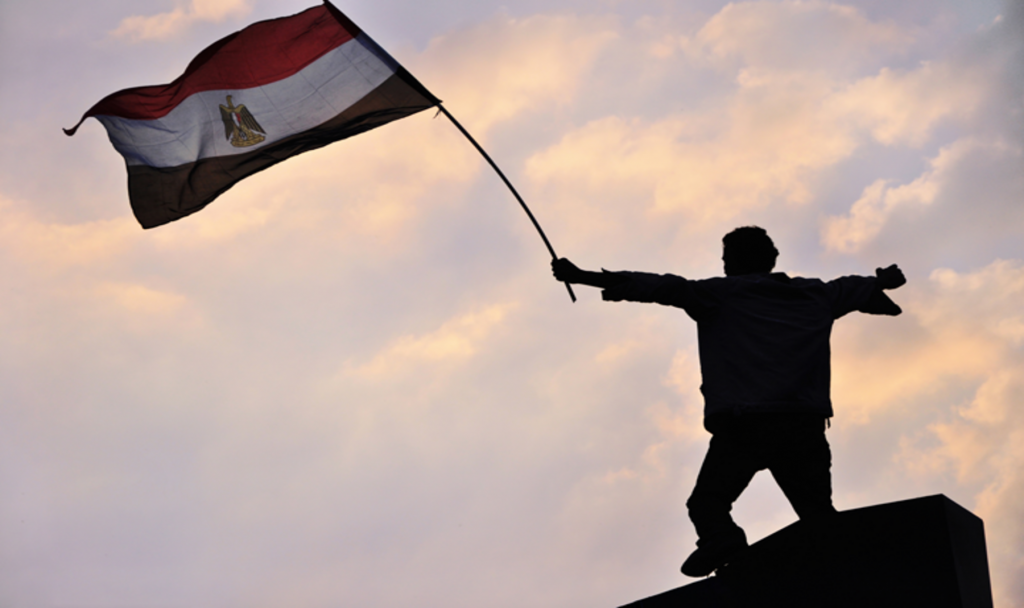Nearly three years and two revolutions have passed since the masses first filled Tahrir Square, and Egypt seems no closer to becoming an open, liberal society. Is there yet hope?
This past August, I arrived in Egypt to an army-enforced curfew, and an uncanny, almost unnatural absence of morning traffic. My latest trip to Cairo took place just two months after thirty million Egyptians had taken to the streets to protest the increasingly authoritarian rule of Mohammed Morsi and his Muslim Brotherhood movement; the military, led by General Abdel Fattah al-Sisi, had ousted Morsi. Only ten days before my arrival, nearly 500 pro-Morsi protestors had been killed in a nationwide crackdown.
I came looking for the country’s beleaguered secular liberals, hoping to find out what they think about the difficult situation in which they and the people of Egypt now find themselves: Two years after the Egyptian revolution ended President Hosni Mubarak’s 30 years in power, the country’s liberals, who bitterly opposed Mubarak, are now largely aligned with another military-dominated regime.
Is this a betrayal of the revolution’s core principles, or the only way Egypt’s secular democrats can eventually triumph over the theocratic forces of the Muslim Brotherhood who seek to create a coercive sharia-based state? Are Egypt’s liberals simply rebooting their revolution after the failure of Morsi’s government, or is their tolerance of the new military-backed government a strategic error?
Though the Morsi government brought suffering to numerous Egyptians, and led many (perhaps most) of them to despise the Brotherhood, it is not yet clear whether Egypt’s anti-Islamist turn will ultimately bring about a liberal democratic system. By building a narrative for themselves in which the military overthrow was a legitimate expression of democracy, the liberals may be paving the way for a better, freer society. But they could also be setting themselves up for serious disappointment.
It was with these concerns in mind that I met the prominent Egyptian democrat Kamel Mogeith at the Estoril Café in downtown Cairo. The Estoril has only two windows, made of tinted glass heavy enough to blur out the chaos along Talat Harb Street and prevent passerby from seeing inside. There’s a valiant yet under-stocked attempt at a full bar. The waiter, dressed in a faded white dinner jacket, jots the orders down in French. The wood-paneled, vaguely art deco interior has the same decayed and hazy look as the rest of Cairo’s smog-choked downtown. But like the more famous Café Riche a block away, the Estoril’s role as a gathering place for Egypt’s intellectuals hasn’t diminished over the decades.
Mogeith, a socialist newspaper columnist with a doctorate in the history of education, was nursing a bottle of the locally brewed Stella beer, in some ways a symbol of the paradox in which Egyptian liberalism inevitably finds itself. It is watered-down swill, but considering Islam’s prohibition of alcohol, it is remarkable that it exists in one of the more religiously intense countries in the Sunni Muslim world. Mogeith explained to me why he feels the military’s replacement of a popularly elected government wasn’t quite the offense to democracy it appeared to be.
“June 30 is a real revolution,” he said, referring to the day mass protests kicked off the army’s overthrow of Morsi’s government. “And it’s more comprehensive and more precise in its goals than January 25 [the day the 2011 revolution began]. On January 25, we knew what we didn’t want, but we didn’t know what we really wanted. On June 30, we knew our goal, which is to have a modern, civil state, with all of the aspects of a civil state—a constitution, transparency, and a state of law and order.”
Egypt’s secular revolutionaries also wanted transparency and the rule of law in 2011, when they invested much of their energy and credibility protesting against the Supreme Council of the Armed Forces, the military junta that replaced the fallen Mubarak. Now, however, the question is whether the Egyptian military, or in fact any military, can bring liberalism and tolerance, let alone democracy, to a country that’s had only one civilian president in 5,000 years. Egypt’s liberals are, in theory, the country’s only political faction that fully embraces an open society. The question is whether they can succeed in working with the military to bring those values into effect in Egypt.
Mogeith asserts that Morsi’s replacement was not a military coup, and he believes the army was simply following the Egyptian people’s lead. “How come we accept that the army took sides with Egyptian protestors on January 25,” he asked, “and we do not accept the fact that they sided with the Egyptian nation on June 30?”
I spoke to many other Egyptian liberals who largely agree with Mogeith; some go even farther than he does. They see Morsi’s ouster and the emergence of General Sisi as the most powerful man in Egypt as nothing less than a vindication of the revolution—proof that democracy and secular republicanism lie at the heart of Egypt’s political aspirations.
Their narrative goes something like this: Morsi, who was democratically elected, lost his popular mandate when he issued a widely-hated constitutional decree in November 2012. This decree prevented the impending dissolution of the largely Islamist constitutional assembly, and effectively placed Morsi above the nation’s entire judicial system, effectively making him more powerful than Hosni Mubarak ever was. “He gave himself powers that have not been claimed under Nasser [the legendary dictator who ruled Egypt from 1956-1970] or any previous leader,” says Mahmoud Abaza, a law scholar and former head of the secularist Wafd party. “What Morsi did was a coup de palais. After that moment, he could not claim any legitimacy.”
Thirty million Egyptians took to the streets on June 30, 2013. They demanded that Morsi either call early presidential elections or resign, which liberals here see as proof of the people’s desire to replace him. When Morsi refused, the army had no choice but to remove him, just as they had no choice but to replace Hosni Mubarak in 2011. General Sisi swiftly handed the presidency to the head of Egypt’s constitutional court, appointed a cabinet with women and minorities, and ensured that major secular figures were installed in the highest offices of the new government.
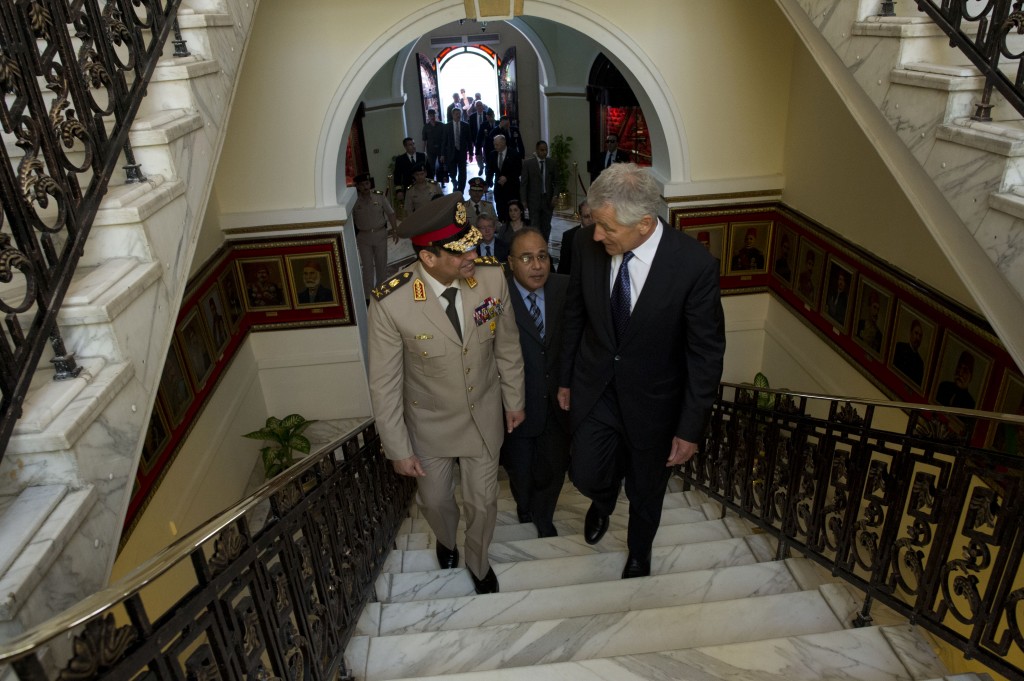
U.S. Secretary of Defense Chuck Hagel with Egyptian Minister of Defense Abdel Fatah Al-Sisi into the Ministry of Defense in Cairo April 24, 2013. Photo: Erin A. Kirk-Cuomo/Department of Defense
The liberals’ narrative isn’t bothered by the constitutional implications of Sisi’s actions. Nasser Amin, director of the Cairo-based Arab Center for the Independence of the Judiciary, admits that the general’s appointment of a new government was an extra-legal move. But so, he says, was an earlier and even more iconic victory. “The revolution toppled Mubarak and his regime and put its members in jail,” he notes. “But if we had talked about legality with respect to January 25, then Mubarak would have completed his term as president.”
Like many liberals, Amin sees Morsi’s replacement as the “third wave” of the Egyptian revolution, with the first two being the ouster of Mubarak and the replacement of the transitional military council with an elected civilian government. Ziad Eleleimy, a former member of parliament who was imprisoned in 2003 by the Mubarak regime, agrees. “The third wave,” he says, was composed of “those who had issues with having a theocratic state.” The secularists, he believes, have not been co-opted by the military. Indeed, they forced the army to take action against Morsi’s abuses of power.
He is not alone in believing this. Nasser Abdel Hamid, a former leader of the Coalition of Revolutionary Youth and a columnist for the Al-Masry Al-Youm newspaper, asserts, “There was no way [out of the June 30 crisis] except for the military to listen to the street and implement its demands. If the military did not respond to the people’s motives and demands… then they would be furious toward the military as well.” By dismissing Morsi, he says, Sisi was simply implementing a roadmap that Egypt’s secular parties formulated during a meeting at the Zamalek Mariott hotel on June 22, 2013. “In this plan,” he explains,
The president of the Constitutional Court would be appointed as president, a government of technocrats will be formed, and an assembly will put down a draft for the constitution, followed by a constitutional referendum, and finally parliamentary and presidential elections. Sisi has only adopted the outcome of that conference.
It must be said, however, that Egypt’s liberals have an uphill struggle ahead of them. They have had little electoral success since 2011, having been soundly defeated in parliamentary and presidential elections, and in a constitutional referendum. But they have played a major role in the political upheavals that have gripped Egypt over the past two years. The liberals are well aware of this, and have built it into a powerful self-mythology. The military government, they believe, only toppled Mubarak and seized power because the revolutionary bloc pushed Egypt to the brink during the “eighteen days” of mass protests. The Brotherhood only ruled because of the revolutionaries’ insistence on a transfer to civilian authority and their opposition to Ahmed Shafiq, Mubarak’s former prime minister, during the second round of presidential elections in 2012. In their eyes, Mubarak, the military government, and Morsi all fell from power because they antagonized Egypt’s secular liberal revolutionaries, who remain the guardians of Egyptian democracy despite the military’s return to power.
As Ziad Elelaimy puts it, “each of the other factions won at different times only when the revolutionaries were siding with them. But they were fooling the revolution, because the only factor that can really determine which side will win is which one the revolution sides with.” For Egypt’s liberals, there was no military coup on July 3, 2013, only an assertion of the revolutionary forces that have determined Egypt’s fate since Mubarak’s overthrow.
It is true that the Muslim Brotherhood was and is hated by a large number of Egyptians, and that the brief reign of the Brotherhood was characterized not only by increasingly oppressive Islamist measures but also by an unfathomable incompetence that exacerbated the already-perilous economic position of most Egyptians. Indeed, on July 1, 2013, the Brotherhood-affiliated Freedom and Justice Party’s headquarters were burned to the ground by a violent mob. And it’s true that public order was deteriorating when the army’s crackdown on the Brotherhood began, perhaps to the point that the military government’s credibility was at risk. But the crackdown has been marked by events that may not bode well for the future of Egyptian liberalism.
Chief among these is August 14 breakup of a series of pro-Islamist sit-ins at Nahda Square and the Rabaa mosque. According to human rights groups, nearly 400 people were killed by gunfire when police clashed with demonstrators, who were demanding that Morsi be restored as president. While the police claimed that they acted in self-defense, and the government alleged that the Morsi supporters were armed, other officials stated that fewer than ten guns were recovered from the site of the Rabaa sit-in, where much of the violence took place.
The secularists I spoke with were relatively untroubled by the violence. When I asked Nasser Amin about the incident, he directed me to Article 21 of the UN’s International Covenant on Civil and Political Rights. “We could say that this sit-in actually violated this article through its long duration in a residential area,” he said, “and the turning of that sit-in into an armed or militant camp which endangers the residents’ rights, as well as their security.” Farid Zahran, a vice president of the Egyptian Social Democratic Party who was imprisoned under Mubarak, believes that the police used excessive force, but also thinks that the Islamists were inviting a violent response. “How would the American police react against these kinds of armed protestors when they attack governmental institutions or when 76 churches are burned to the ground?” he asks.
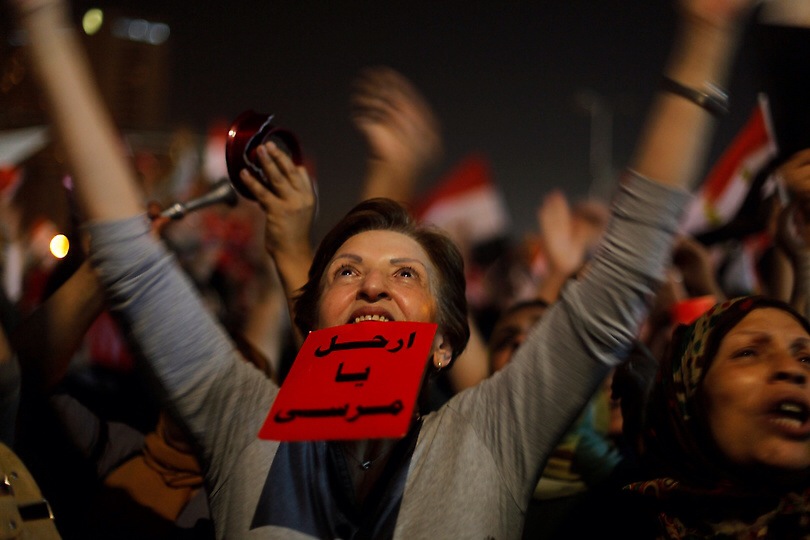
An Egyptian protester holds a red card with Arabic that reads: “Morsi: leave.” June 26, 2013. Photo: Amr Nabil/AP/Flickr
Andraws Ewida, a former parliamentary candidate for the secularist Free Egyptian Party and an activist with the Maspero Youth Union, told me that the burning of the Rabaa mosque was committed by pro-Brotherhood protestors to destroy evidence that they were torturing their political opponents. Nasser Amin said he was “troubled” by the number of dead; yet he praised the security services for their restraint. “Knowing the performance of the police for the past couple of years,” he said, “I would have expected this number of people killed to be tripled.” He claimed that only 100 protestors had died at Raaba, along with 40 at Nahda. The interior ministry claims that over 40 of its police officers were killed in the violence as well, a number that is likely credible. As one Egypt watcher told me, “the Ministry generally doesn’t lie about when their own people die.”
There’s a cold pragmatism behind the response of Egypt’s secular liberals to the violence in Rabaa and Nahda. Zahran admits that the Brotherhood’s incompetence and the recent crackdown are a potential boon to an often-isolated liberal cause. “I perceive myself as a minority in Egypt, because there are few democratic politicians here,” he says. “Yet normal people want to get rid of the Ikhwan [the Muslim Brotherhood] even if it means burning them to death.”
But the secularist version of events hints at motives that pragmatism alone cannot adequately explain. With the fall of Morsi and the general unpopularity of the Brotherhood, secularists can now plausibly claim that the Muslim Brotherhood represents an alien force in Egyptian political life. They can cast Morsi’s failure to govern as a failure of ideology. As Nasser Abdel Hamid puts it, Morsi wanted to “Ikhwanize” Egypt, and replace the institutions of the civil state with ones that answered only to the Muslim Brotherhood. In his mind, the Brotherhood’s strategy was hardly unprecedented. “There has always been violence between the Ikhwan and the state itself,” he said. “The Ikhwan already assassinated Prime Minister Noukrashi and Judge Ahmed Khazandar [head of Egypt’s Court of Appeals] in 1948.”
To the liberals, the June 30 protests proved that Brotherhood-style rule is anathema to an essentially nationalist and secular-republican Egypt. They believe that the violence at Nahda and Rabaa—though excessive—was directed against a terrorist fringe movement that spoke for nothing other than its own now-discredited interests.
Today, it is virtually taken for granted in Egypt that Morsi could not have served out the remainder of his four-year term. One Cairo resident recounted a dark period at the beginning of 2013, when there were riots in Port Said, lynchings in the Delta, constant street battles along Cairo’s downtown corniche; and even an attack on the Semiramis, one of the capital’s fanciest hotels. Public order was fraying, the economy had tanked, and Morsi seemed more concerned with consolidating the Brotherhood’s power than addressing his people’s needs. There is a decent case to be made that the army had to step in. But this does raise the question of whether the military can or wants to manage a transition to democracy.
The secularists appear to think so; and they are fond of pointing out differences between the earlier transitional military government and the new one under Sisi. “Sisi is smarter,” says Eleliamy. “General Sisi did not interfere in any of Morsi’s decisions. He let things go from bad to worse during Morsi’s year, until people actually demanded that the military save them from the Ikhwan.” But Eleliamy understands that Sisi’s sense of pragmatism could backfire. “How they perceive democracy is quite similar,” Eleliamy says of Sisi and the former transitional military council. “They wear the same uniform. The military is the military and cannot be trusted.”
Perhaps the best example of the military’s sometimes problematic relationship to democracy comes from the examination of an obscure but nevertheless critical human rights issue. According to Mahmoud Salamani of the activist group No Military Trials, there are currently 12,000 Egyptian civilians facing trial in military courts for various offenses against the armed forces. Some of these offenses can seem remarkably inoffensive. Getting caught after curfew can land you in a military court. So can simply being in the wrong place at the wrong time. Salamani recounted the story of a 15-year-old who was tortured and sentenced to 15 years in jail after being caught up in a series of arrests in early 2011, during Morsi’s rule. “Those who are not in consensus with the army can be arrested and face military trials,” he says. “This is because of the presence of the army in the streets instead of the police…. The military are present in our daily life.” The army is widely popular in Egypt, consistently polling as the most widely supported of Egypt’s institutions.
Even during Egypt’s year-long experiment with civilian rule under the Muslim Brotherhood, the number of military prosecutions failed to decrease. And the revised constitution will ensure that they remain a fixture of Egyptian life. Under the current draft, civilians attacking army complexes or buildings will be tried in military court, a more elastic provision than it seems, given the ubiquity of the army and its assets. Salamani has little doubt that dealing with a military that wields such arbitrary legal power will be a challenge for the country’s democrats. “The military are like a state within a state,” he comments, “and their own aim is to protect themselves, to protect their economy, their factories and their balance sheet, no matter who comes to power.” His group wants a constitutional provision that bans military trials for civilians, but admits it is hard to get people interested in the issue. “You cannot get someone to support you in terms of human rights issues and so on, unless they or a family member have suffered,” he says.
In Cairo during late August, talk of the army’s human rights record is decidedly muted. But the army’s presence is everywhere, beginning with Cairo’s curfew, which was set at 7pm before being relaxed to a still-burdensome 9pm two weeks after the Rabaa violence. On a typical summer night, Cairo bustles with activity as soon as the city cools down to a livable temperature. During the day, the desert sun heats the city’s polluted air until it’s an almost-unbreathable solid mass. At night, the temperature plummets, and Cairo turns from a sleepwalking heat-trap into a vibrant city. During the summer, Cairo is practically nocturnal.
In downtown Cairo this August, the scene an hour before curfew was an eerie reversal of the city’s natural rhythms. Usually, street vendors clog the sidewalks and families cram into candy stores and pleasure barges along the Nile. Thanks to the curfew, the vendors under the 6th of October Bridge have vanished by 8pm, a time when they would usually be expecting a crush of customers. On the bridge itself, only a single tea vendor was setting up tables and chairs on the pedestrian walk at night, a fixture of Cairo’s evening landscape. His pop-up café was usually completely empty, and the pleasure barges, decked out in their iconic and gaudy Christmas lights, always sat moored on shore.
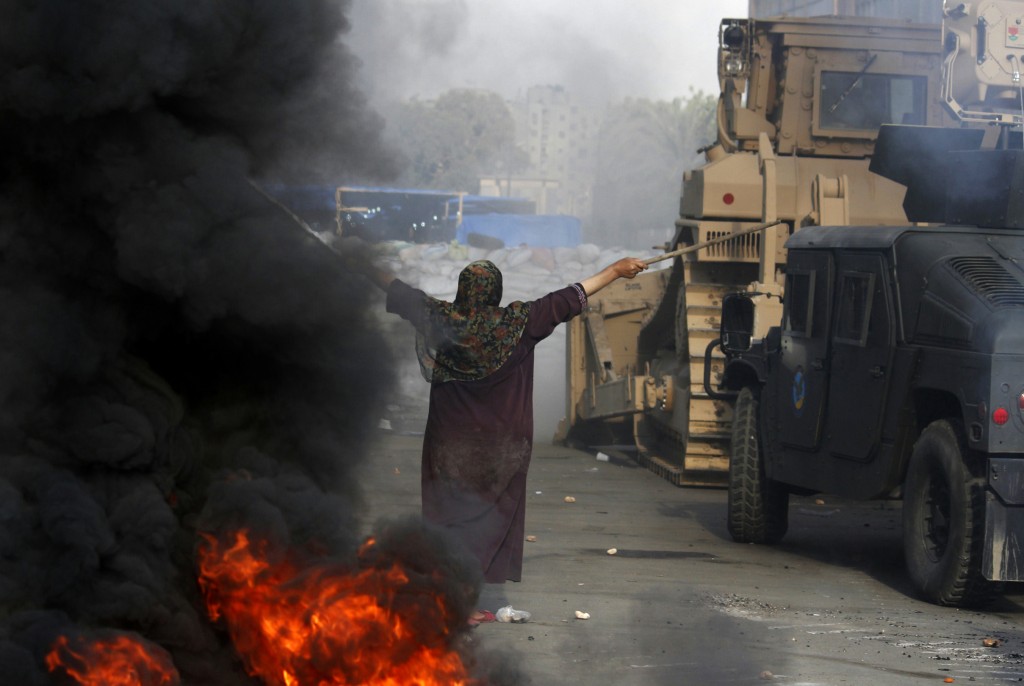
An Egyptian woman tries to stop a military bulldozer during the Rabaa crackdown. Photo: AFP/Mohammed Abdel Moneim / flickr
Unlike Mubarak’s attempts to pacify the city in 2011, Cairenes have been adhering to the latest curfew. Yet the restrictions are a clear indication that, while the president is technically a civilian, the army is still capable of bringing life to a standstill and radically altering Egyptian society in the name of stability and order.
But a large number of Egyptians might like it that way for now. There is something to the idea that most of the country is fairly passive when it comes to politics. An activist from the liberal National Salvation Front told me,
If you look at geography, Egyptians are concentrated around the rivers. People plant and wait. This takes patience and stability …. The majority of Egyptians like to have something they can predict, and want to be able to plan months ahead. We’re extremists with regard to law and order and organization.
Then there’s Egypt’s longstanding admiration for the military. As Mahmoud Abaza explains, respect for the army might be the closest thing to a consensus among the Egyptian people. “The army was founded in 1880, and is the first institution in the modern period of the Egyptian nation,” he says. “For 14 centuries, Egypt was a part of other people’s empires: Either the Alexandrian empire or the Roman Empire or the Arab empires or the Ottomans. But the Egyptian army was not Turkish or Mamluk—it was Egyptian.”
The army embraces its historic role as the vanguard of Egyptian modernity and nationalism; and Egyptians crave the security that only the army can deliver. Yet as downtown Cairo’s shuttered cafes demonstrate, the same social and historical forces that have made the army one of the most beloved and trusted institutions in Egypt also give it enormous power.
The country’s secularists may have finally figured out how to make this work to their advantage. “General Sisi might suggest a kind of special situation for the military in the coming political order, just like Turkey before,” Zahran says. Abaza agrees. “Perhaps our army will be… a bit like the Turkish army,” he speculates, “which will intervene every time different political movements are unable to defend the state or the existence of the state.” After Morsi’s election, Western commentators speculated about a different kind of “Turkish model” for Egypt, in which Islamist parties would hopefully be moderated by the realities of democratic politics. Yet Turkey’s more recent experience shows that democracy can suffer under such a system, and it’s unclear which of the two Turkish models might prevail in Egypt.
The secularists aren’t exactly happy about the army’s permanent role in Egyptian politics; but as the past two months have demonstrated, they are willing to work within a system where the military has a final veto over who will hold power.
Since January 25, Cairo has almost become synonymous with protest and unrest. Egypt did not turn into post-revolutionary Iran, where Islamists were both competent and popular enough to quickly consolidate power. In fact, the exact opposite happened: The theocrats squandered their shot at power, and Egyptian politics remain more open and chaotic than they were under Mubarak. This may be the most significant legacy of the Egyptian revolution. “Prior to the fall of Mubarak’s regime, politics was limited to a few intelligent and well-cultured people,” says Mogeith from his perch at the Estoril Café. “But after January 25, politics became like people’s food. It was their point of focus.”
Whatever its other consequences—the collapse of the economy, the political polarization, the loss of parts of Sinai to terrorist groups, and a seemingly permanent sense of national crisis—the revolution did open up Egypt’s political space, which has been the domain of strongmen and autocrats since the dawn of Egypt’s millennia-old history.
This summer in Cairo, however, it seemed as if that very basic gain might be in danger. APCs were parked at nearly every major square, including the iconic Tahrir, where a row of at least 30 military vehicles was positioned outside the Egyptian Museum. When I visited Cairo in June 2011, Tahrir was filled with anti-military protestors on a 24-hour basis, secularists who were paralyzing the capital’s downtown area in an attempt to win concessions from a heavy-handed military regime. This year, Tahrir has returned to being a normal and permanently-gridlocked traffic circle, with a few lonely, seemingly-abandoned tents displaying banners with slogans like “Anne Patterson, Get Out Of Egypt And Go To Hell” and “Obama, You Can’t Fool Your People And The World: You Finance And Back Terrorism.” (The military’s supporters see both Obama and U.S. Ambassador Patterson as pro-Muslim Brotherhood.) In the posh Cairo neighborhood of Zamalek, block after block of buildings display pictures of Sisi. The city as a whole is eerily calm, as if making a conscious effort to erase the recent chaos from memory.
But I did see one protest against the military. After my interview with Mogeith, I noticed a small group of anti-coup liberals gathered in the middle of the Talat Harb traffic circle. They were members of the pro-labor April 6th Movement, which has fractured over the issue of Morsi’s ouster. While they are no fans of the Brotherhood, some of their constituency is distinctly uneasy with his replacement. The protesters were mostly young people, carrying placards that read “Down With Anyone Who Leads Like Mubarak,” and depicted an anonymous pair of handcuffed wrists. Drivers glared at them as they came through the traffic circle. On the other side of the street, a vendor was selling stacks of pictures of Sisi, including one with his gleaming visage next to the beloved Gamal Abdul Nasser.
“People are blindfolded by the Ikhwan’s failure,” said one protestor, a young woman in a headscarf and Western dress. “They feel their only salvation is the military.” In the chaos of midday Cairo, the small gathering was barely noticeable. From the other side of the square it wasn’t even clear that a demonstration was in progress. Even the protesters seemed to realize that their efforts were purely symbolic. “The curfew is part of the army putting itself in power again,” the woman told me. “The coming government will be under the rule of the military.”
Egypt’s liberals believe this may be a necessary evil. And it is possible to see their point of view as the sign of a maturing movement. Egypt’s liberals were once a disorganized revolutionary bloc that couldn’t agree on a single presidential candidate in 2012 and wasted much of 2011 waging an unpopular series of sit-ins against the transitional military government; all while the Muslim Brotherhood shored up its relationship with the military and built a formidable electoral operation.
Today, the liberals realize that events and even, to a certain degree, popular opinion are on their side. They are beginning to think in terms of incremental steps, of a long-term and by no means straightforward struggle that might take years, and perhaps several additional “waves” of revolution, to sort out. “The secularists are getting more pragmatic,” the National Salvation Front activist told me. “People learn.”
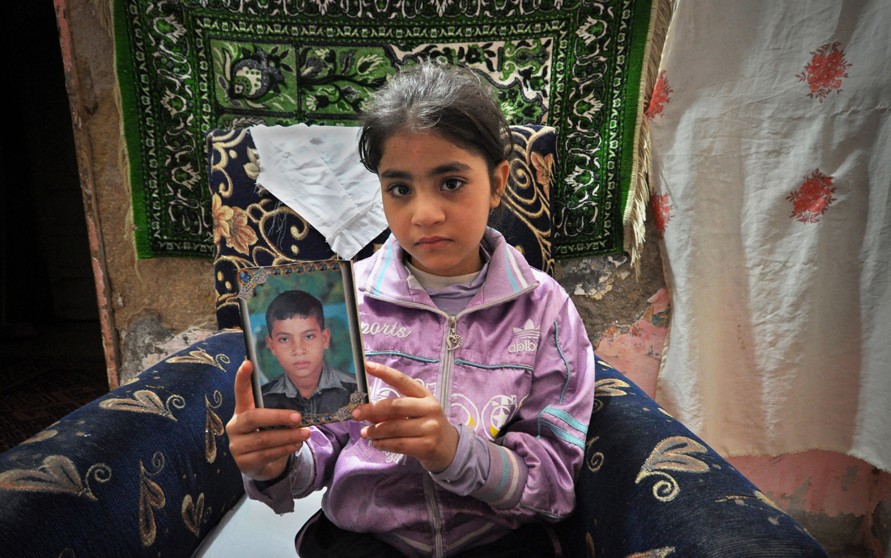
Sister of Mohammed Ehab Sayed Morsi, a 15-year-old who was sentenced to 15 years in prison in a military trial. Photo: Jonathan Rashad / flickr
The question is how long this will take and whether it can eventually succeed. At the moment, something similar to the army-dominated Mubarak regime is firmly back in charge, and there appears to be very little domestic support for removing them from power. Already, rumors are flying that Sisi will run for president in the next elections, and informed observers think he stands a very good chance of winning. At the moment, there is nobody in the liberal camp who appears capable of mounting a convincing opposition to him. And the reason may be that Egypt’s liberals have made a painful, if arguably necessary, sacrifice to prevent a theocratic takeover.
As Egypt settles down into its old-new rhythms, the country’s liberals are trying to figure out what they want to build in the existing system’s place. Right now, at what could be the height of their post-revolutionary influence, they are still struggling to find an answer.
![]()
Banner Photo: Gigi Ibrahim / Wikipedia






